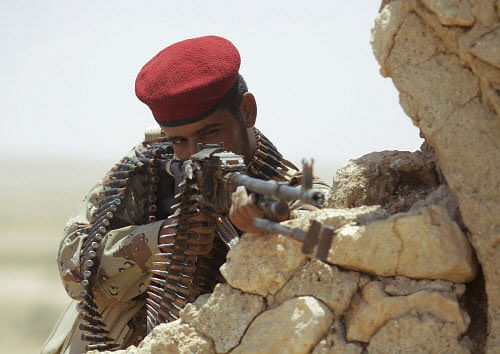
Sunni militants today captured two border crossings, one along the frontier with Jordan and the other with Syria, security and military officials said, as they pressed on with their offensive in one of Iraq's most restive regions.
The fall dealt Iraq's embattled prime minister a further blow and brought the war to the doorstep of Jordan, a key ally of the US that also borders embattled Syria to its north.
The blitz by the Islamic State of Iraq and the Levant in Iraq's vast western desert take the al-Qaeda-breakaway group closer to its dream of carving out a purist Islamic state straddling both Syria and Iraq.
Controlling the borders with Syria will also help it supply fellow fighters in Syria with weaponry looted from Iraqi warehouses, significantly reinforcing its ability to battle beleaguered Syrian government forces.
If they succeed in their quest, they could further unsettle the already volatile Middle East and serve as a magnet for Jihadists from across the world - much like al-Qaeda attracted extremists in Taliban-ruled Afghanistan.
The Iraqi officials said the militants took over the Turaibil crossing with Jordan and the al-Walid crossing with Syria after government forces there pulled out.
The capture of the two crossings follows the fall on Friday and Saturday of the towns of Qaim, Rawah, Anah and Rutba. They are all in the Sunni dominated Anbar province, where the militants have since January controlled the city of Fallujah and parts of the provincial capital Ramadi.
Rutba is on the main highway from Baghdad to the two border crossing and the capture has effectively cut the Iraqi capital's main land route to Jordan.
Iran's supreme leader Ayatollah Ali Khamenei said he was opposed to any US intervention in the Iraqi crisis, accusing Washington of fomenting the unrest. His comments appeared to quash recent speculation that the two rivals might cooperate in addressing the shared threat posed by the extremists.
The two crossings and the four towns are the first seized in Anbar since the Islamic State and its allies overran the city of Fallujah and parts of Ramadi. Government troops have not been able to dislodge them after months of fighting.
The capture of Rawah on the Euphrates River and the nearby town of Anah appeared to be part of a march toward a key dam in the city of Haditha, the destruction of which would damage the country's electrical grid and cause major flooding. The dam was built in 1986. Iraqi military officials said more than 2,000 troops were quickly dispatched to the site of the Haditha dam to protect it.